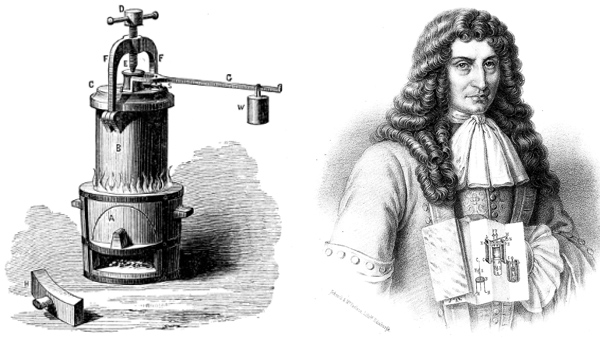 French-born British physicist, Denis Papin, could be termed the original master of pressure having invented the pressure cooker and suggested the first cylinder and piston steam engine. His design wasn’t practical but it was improved upon by others and and it led to the development of the steam engine, a world-changing contribution to the Industrial Revolution.
French-born British physicist, Denis Papin, could be termed the original master of pressure having invented the pressure cooker and suggested the first cylinder and piston steam engine. His design wasn’t practical but it was improved upon by others and and it led to the development of the steam engine, a world-changing contribution to the Industrial Revolution.
This founding work with pressure would have been a huge influence on the introduction of pressure reactors for laboratory work too.
Born 369 years ago on August 22nd 1647, Papin (died c. 1712 in London, England), Papin assisted the Dutch physicist Christiaan Huygens with his air-pump experiments and went to London in 1675, aged 28, to work with English physicist Robert Boyle. In 1679 Papin invented his “steam digester” (the pressure cooker) which was a closed vessel with a tightly fitting lid that confines the steam until a high pressure is generated, raising the boiling point of the water considerably. With safety an obvious concern he also invented a safety valve to prevent explosions. It probably wasn’t quite on a par with our amazing PressureSyn high pressure reactor with the amazing clamp that prevents you from opening the system whilst any pressure remains within, but it was a huge step.
Observing that the enclosed steam in his cooker tended to raise the lid, Papin conceived of the use of steam to drive a piston in a cylinder, the basic design for early steam engines; he never built an engine of his own, however.
In 1705 the German physicist and philosopher Gottfried Wilhelm Leibniz sent Papin a sketch of the first practical steam engine, built by Thomas Savery of England. That sketch stimulated Papin to further work, culminating in his Ars Nova ad Aquam Ignis Adminiculo Efficacissime Elevandam (1707; “The New Art of Pumping Water by Using Steam”). In 1709 he built a man-powered paddle-wheel boat that successfully demonstrated the practicability of using the paddle wheel in place of oars on steam-driven ships. Later that same year Papin returned to London, where he lived in obscurity until his death.
So, with some degree of thanks to Papin, you have a choice of pressure vessels (single or parallel, high or low pressure, low or high temperature!), with fabulous safety features, that make working under pressure a lot less stressful than back in 1679!
(source: Britannica Encyclopedia)




